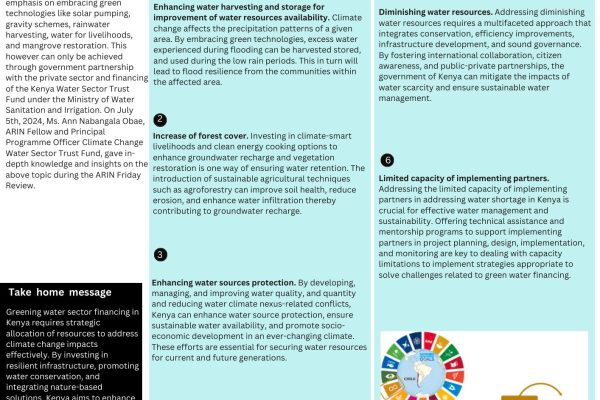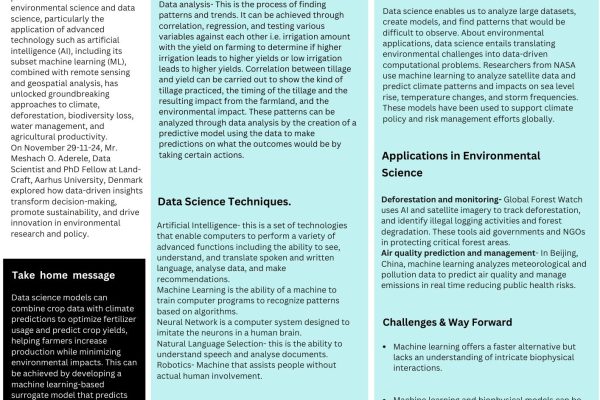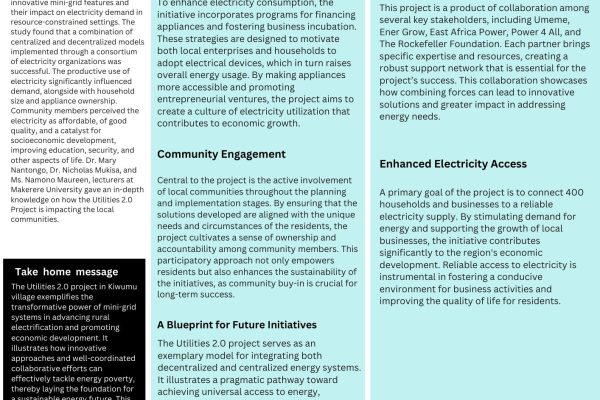Introduction
Energy is a cornerstone of development. A reliable, secure, and affordable energy supply is essential for socioeconomic growth and poverty alleviation in any country. (OECD/IEA & IRENA, 2017). However, despite the acknowledgment role of energy in economic growth, per capita energy consumption in Africa remains stagnant. This review examined the factors driving energy transition and analyzed the importance of renewable energy in West Africa’s energy transformation, as well as prioritized potential renewable energy sources as presented by Dr. Faye Gueye, Lecturer at the Public Policy Institute, Dakar, Senegal on September 13 2024.
Key Messages.
Investing in Renewable Energy Infrastructure
The transition towards renewable energy infrastructure presents an invaluable opportunity for West African nations to significantly lower greenhouse gas emissions and counteract the adverse effects of climate change. By embracing renewable energy sources, countries in the region can enhance their energy security, thereby minimizing dependence on the unpredictable fluctuations of fossil fuel prices. Over time, the integration of diverse renewable energy options into national electricity grids can improve the reliability and affordability of energy supply, ultimately fostering sustainable long-term economic stability and growth.
Reducing Dependency on Fossil Fuels
The development of renewable energy projects holds the promise of addressing urgent energy accessibility challenges while simultaneously reducing reliance on traditional fossil fuels. Initiatives that focus on solar and wind energy installations can rapidly supply electricity to isolated and underserved communities, significantly elevating living standards and bolstering local economies. Furthermore, the renewable energy sector is poised to generate numerous job opportunities and stimulate the growth of local industries, thereby contributing to broader economic development.
Establishing Clear Policy Objectives
For renewable energy development to flourish, it is essential that governments articulate clear and consistent policy objectives. This entails setting ambitious yet attainable targets for renewable energy capacity and establishing definitive timelines. Additionally, it’s crucial to outline specific goals tailored to various forms of renewable energy, such as solar, wind, hydroelectric, and biomass. By creating a stable regulatory environment, governments can encourage investment and innovation in the renewable sector.
Utilizing Shared Renewable Resources
West Africa boasts a wealth of renewable energy resources, particularly solar and wind energy. By fostering regional collaboration, nations can more effectively tap into these abundant resources. For instance, areas with high solar potential could supply electricity to regions with less sunlight, creating a balanced energy distribution. Such cooperative efforts not only optimize resource utilization but also promote regional integration and solidarity.
International Aid and Grants
The role of international aid is instrumental in financing renewable energy initiatives. Governments, non-governmental organizations (NGOs), and multilateral institutions play a critical part in providing the necessary funding for these projects. Organizations such as the World Bank, the African Development Bank (AfDB), and the United Nations Development Programme (UNDP) offer grants and concessional loans aimed at supporting energy development in emerging economies. These funds can help catalyse projects that might otherwise lack the financial backing necessary for implementation.
Conclusion
By focusing on the aforementioned aspects, West Africa can unlock its immense renewable energy potential, paving the way for sustainable development and significantly enhancing the quality of life for its citizens. Governments within the region and beyond have a pivotal role to play in nurturing an environment conducive to renewable energy investments. Through sustained efforts and strategic planning, a successful transition to a sustainable energy future is not only achievable but also essential for the prosperity of West Africa.




